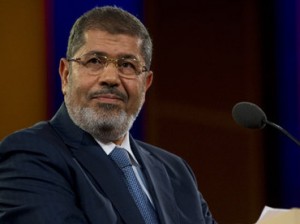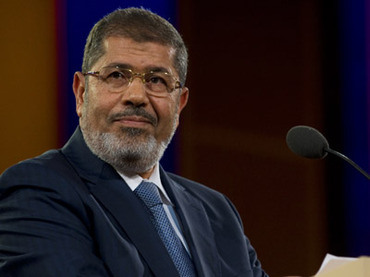
(AFP File Photo)
A cabinet reshuffle is coming “soon”, confirmed President Mohamed Morsi on Saturday evening. Morsi did not specify which positions in Prime Minister Hesham Qandil’s cabinet, only saying that the “most efficient” would be given the posts in the reshuffle. The president discussed a wide range of domestic and foreign issues facing the country in an interview on Qatari-owned channel Al-Jazeera.
When asked about the current freedom of expression and the media, the president insisted that it had improved since the revolution, pointing to the increasing number of publications and channels that had opened over the last two years. He also highlighted the abolition of preventive detention of journalists and the presidency’s withdrawal of complaints filed against journalists, saying that the media sector enjoys increasing freedoms.
Morsi said talks with the International Monetary Fund surrounding the tentative $4.8bn loan were still ongoing, but he also added that while borrowing money might be necessary at the current stage, his administration preferred investments, which have great potential according to the president.
The president also touched upon clashes that took place in Downtown Cairo on Friday between Islamist protesters at the High Court building and a group of people opposing the Muslim Brotherhood.
He stressed that the “rule of law” was the most important way to crack down on the wave of violence. He said that security was improving and that the law “makes a distinction between criminals and true revolutionaries”.
Morsi said he was “proud” of his affiliation with the Muslim Brotherhood and the Freedom and Justice Party, but insisted that he was president of all Egyptians and was acting in accordance with that responsibility.
The president also talked about current problems facing the country’s Coptic Christians, saying he did not consider them a minority, claiming that the law and constitution treat all Egyptians equally regardless of religion and said that sectarianism was not an issue Egypt faced.
He made a similar claim about Egyptian women, saying they were an integral part of Egyptian society and did not see any differentiation under law between men.
He also focused on foreign issues, saying that diplomatic relations with Iran were already being practiced by countries in the Gulf and that the relationship between Egypt and Iran would not infringe on the internal affairs of the country, and insisted that engaging Iran was a part of the solution to the Syrian crisis.
Morsi went on to express his respect for the opposition, saying its existence was natural in a democratic regime that holds elections, saying it was in its right and duty to oppose him.
He expressed some regret at the “phrasing” of his November constitutional decree, saying he thought he should have made the wording clearer, and initially include the amendments provided in the subsequent decree the following month.

